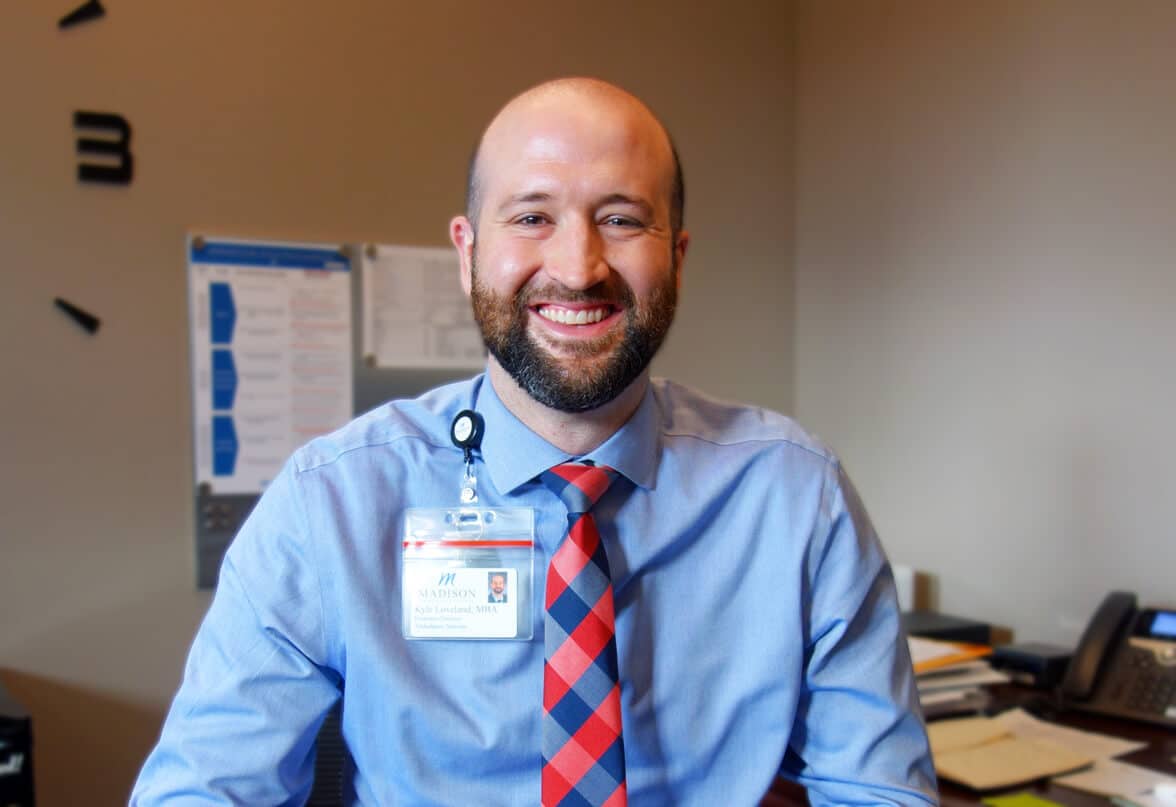Learning What You Do Not Know with Executive Director Kyle Loveland
Learning What You Do Not Know with Executive Director Kyle Loveland

Story and Photo by Jeremiah Kalb
Prolific poet and philosopher Ralph Waldo Emerson once proclaimed, “In my walks, every man I meet is my superior in some way, and in that I can learn from him.”
Ambulatory Services Executive Director Kyle Loveland has found great success in striving to live this principle throughout his career.
“I have benefited greatly by realizing that every person I work with is better in at least one way, often many than I am,” Loveland says. “I always learn something from each person I work with.”
He has used this success principle several times to get where he was as a hospital intern to presently providing Ambulatory Services leadership to about 100 employees and support for about 40 providers.
Raised in Colorado and Wyoming, Loveland did not grow up thinking he would find a career in healthcare.
“It wasn’t until my last few semesters of my undergrad that I realized there was even a business side of healthcare and that it might be a good fit for my business brain and my love of people,” he says.
After a hospital internship in 2011 and a series of position advancements as a front-line employee and leader, Loveland remembers when he was invited to apply for the Director of Nutritional Services position.
I laughed because I had zero experience in that position,” Loveland says.
While he held images of sharp knives, searing meats, bubbling pots, and the hustle of plating orders, the hospital did not want him to be a cook like he initially thought.
“I was told we need you to be able to fix the business side of things and improve there,” Loveland says.
He knew he could do that, applied, and got the job.
As a practitioner of the Shingo Model, based on the principles of Shigeo Shingo, who taught thousands of engineers at Toyota, Loveland started to address operational issues, but with a human touch.
“When you focus on and take care of the people, everything else seems to fall in place,” he says.
When one thinks of improving the bottom line, drill-downs on spreadsheets often come to mind first.
The first two principles of the Shingo Model are “Respect Every Individual” and “Lead with Humility.”
In the beginning, team members whispered, “Kyle does not know anything.”
Determined, Loveland would smile back and tell them they were absolutely right. “That’s why I’m going to shadow you,” he told them.
The first month Loveland started by following each employee through their workday.
He had a plan to learn and serve.
“I had three main questions,” he says. “I asked them, what do you love about your job? What do you not love about your job? And what would you change if you could about any process that you feel is broken?”
The response he received from his team was positive.
“First of all, I got comments like, I can’t believe you are here,” Loveland says. “You’re actually asking me what I think.”
With a clear starting point, he rolled up his sleeves and went to work, sometimes behind the grill and cash register.
When Loveland finished his work in the Paragon, they were on track to have higher revenue than in years past; then, the pandemic hit, forcing them to close their doors.
“I left it in great hands with Timmy and the rest of the team,” he says. They did a tremendous job throughout the pandemic.”
Today, Loveland is making great strides in his current role by continuing to build and foster relationships and learn who his people are and how he can best support them.
“Kyle is a pragmatic, process oriented, people person,” CNO Kevin McEwan says. “These are the attributes and characteristic that have led to our continued success.”
So we see that learning and growing go hand in hand.
